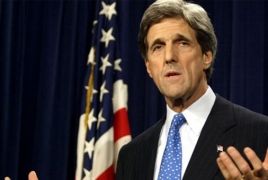
The White House said on Tuesday, September 15 the United States would like to see Russia engage constructively with the international coalition fighting Islamic State militants in Syria, rather than build up its own military presence there, according to Reuters.
White House spokesman Josh Earnest said President Barack Obama had not spoken to Russian President Vladimir Putin about the issue but would attempt to do so when the president "determines that it would advance our interests."
The two countries have been in frequent communication. Secretary of State John Kerry spoke to Foreign Minister Sergei Lavrov by phone on Tuesday, the State Department said, in their third conversation since Sept. 5.
The State Department said Kerry made clear that Russia’s support for Syrian President Bashar al-Assad "risks exacerbating and extending the conflict, and undermining our shared goal of fighting extremism if we do not also remain focused on finding a solution to the conflict in Syria via a genuine political transition."
Russia's Foreign Ministry said Lavrov had stressed the need to create a united front to battle terrorist groups in Syria.
U.S. officials have voiced concern about Russia's increasing military presence in Syria, saying it appears to be aimed at strengthening the government of Assad, a longtime Russian ally, rather than seeking a transition to a new political leadership.
CIA Director John Brennan told journalists in Austin, Texas, that there was "fundamental disagreement" between Washington and Moscow about the role Assad has played in making Syria a magnet for foreign fighters and militant groups.
Russia has positioned seven T-90 tanks plus artillery at an airfield near the Assad stronghold of Latakia. Some 200 Russian naval infantry soldiers have been deployed to the airfield, along with temporary housing units, a portable air traffic control station and components of an air defense system.
Air Force Secretary Deborah James described the Syria buildup as another “worrying series of events out of Russia.”

